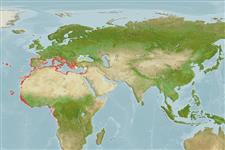Environment: milieu / climate zone / depth range / distribution range
Ökologie
seewasser riff-verbunden; standorttreu; tiefenbereich 2 - 40 m (Ref. 10797). Subtropical; 46°N - 12°S, 32°W - 36°E
Mediterranean Sea: Eastern Atlantic: Along the coast of Portugal to the Gulf of Guinea (St. Thomas Island = São Tomé Island), may also reach Angola. Quoted mainly in the islands (Azores, Salvage, Canary, Annobon, etc.) than on the continent.
Length at first maturity / Size / Gewicht / Alter
Maturity: Lm ?, range 7 - 7.3 cm
Max length : 25.0 cm TL Männchen/unbestimmt; (Ref. 10797); common length : 13.0 cm TL Männchen/unbestimmt; (Ref. 10797)
Rückenflossenstacheln (insgesamt) : 14; Rückenflossenweichstrahlen (insgesamt) : 9 - 11; Afterflossenstacheln: 2; Afterflossenweichstrahlen: 9 - 11.
Adults form small shoals in midwater above or near rocky reefs or above seagrass meadows (Posidonia. They feed on small planktonic or benthic animals (Ref. 6760). Reproduce in summer (Ref. 6760). Eggs characterized by adhesive filaments are nested on rocky or sandy bottoms (Ref. 6760). Males guard the eggs (Ref. 6760).
Oviparous, distinct pairing during breeding (Ref. 205). Eggs are demersal and adhere to the substrate (Ref. 205). Breed on rocky or sandy bottoms (Ref. 6760). Males guard the eggs (Ref. 6760).
Loris, D. and J. Rucabado, 1990. Pomacentridae. p. 842-850. In J.C. Quéro, J.C. Hureau, C. Karrer, A. Post and L. Saldanha (eds.) Check-list of the fishes of the eastern tropical Atlantic (CLOFETA). JNICT, Lisbon; SEI, Paris; and UNESCO, Paris. Vol. 2. (Ref. 10797)
IUCN Rote Liste Status (Ref. 130435)
Bedrohung für Menschen
Harmless
Nutzung durch Menschen
Fischereien: weniger kommerziell; Sportfisch: ja
Tools
Zusatzinformationen
Download XML
Internet Quellen
Estimates based on models
Preferred temperature (Ref.
123201): 16.2 - 27.8, mean 20.1 °C (based on 208 cells).
Phylogenetic diversity index (Ref.
82804): PD
50 = 0.5000 [Uniqueness, from 0.5 = low to 2.0 = high].
Bayesian length-weight: a=0.01259 (0.00992 - 0.01598), b=2.94 (2.87 - 3.01), in cm total length, based on LWR estimates for this species (Ref.
93245).
Trophic level (Ref.
69278): 3.8 ±0.4 se; based on diet studies.
Generation time: 4.8 ( na - na) years. Estimated as median ln(3)/K based on 2
growth studies.
Widerstandsfähigkeit (Ref.
120179): mittel, Verdopplung der Population dauert 1,4 - 4,4 Jahre. (Preliminary K or Fecundity.).
Fishing Vulnerability (Ref.
59153): Moderate vulnerability (35 of 100).
Climate Vulnerability (Ref.
125649): Low to moderate vulnerability (27 of 100).
Nutrients (Ref.
124155): Calcium = 35.3 [16.4, 75.9] mg/100g; Iron = 0.564 [0.326, 0.937] mg/100g; Protein = 19.8 [18.8, 20.8] %; Omega3 = 0.227 [0.137, 0.370] g/100g; Selenium = 11.9 [5.9, 23.6] μg/100g; VitaminA = 79.5 [27.3, 240.2] μg/100g; Zinc = 0.895 [0.583, 1.322] mg/100g (wet weight);
